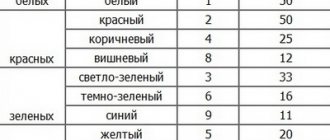“Excursion to school” with children of the preparatory group
MKDOU "Ikovsky general developmental kindergarten No. 1"
Excursion “Getting to know the school”
Teacher Lomakina E.S.
Summary of the excursion “Getting to know the school”
Tasks:
1. To develop interest in school, to consolidate children’s ideas about school: here children learn to read and write.
2. Develop attention and curiosity in children, teach children to listen to adults
3. Foster a sense of gratitude and respect for the teacher’s work.
PRELIMINARY WORK
1. Examination of the painting “School”
2. Reading and analysis of children's fiction about school life, memorizing poetry
3. Conversations, stories from adults about their studies and favorite teachers.
4. Reinforce traffic rules.
I. INTRODUCTORY PART.
Educator: Today, children, we will go on an excursion to school. Be careful, we will be crossing the road, remember the rules of behavior on the street.
II. MAIN PART.
Educator: Guys, we approached the school building. The school begins with spacious, large doors. Look how big and beautiful the school is. What do you think children are taught at school? You see, the children are in a hurry to get to school. You can't be late for school.
Children: Read. Write, sing.
Educator: The school is large and there are many students in it, more than 1000 children.
Educator: Look at the building, how many floors?
Children: Three floors.
What is the name of the area around the school?
Children: Yard, plot.
Educator: This is a schoolyard. What can you see in the schoolyard?
Children: Many flowers, big trees, These trees were planted by the first students and teachers. And in this place a large alley grew.
Educator: Guys, who do you think takes care of the flowers and trees?
Children: Teachers, schoolchildren.
Educator: Who cleans the school yard?
Children: Janitor! Well done! And who helps him?
We went to school.
(They walk along the school corridor). Look what a beautiful, spacious corridor the school has.
We approached the dining room:
Educator: Guys, what do you think is here?
Children: The boys eat here
Educator: This is the dining room where children have lunch when there is a big break. Look how clean and spacious it is, there are guards on duty here. Why are they here?
Children: Help the cooks, set the table.
Moving on
Educator: Guys, you must have a lot of strength and endurance, but what helps people to be strong, healthy, strong?
Children: Sports.
Educator: And for this purpose, physical education lessons are held at school. Now we will go to the gym. And you will see everything for yourself. During these lessons, children play, run, and learn to perform various sports exercises.
Educator: Guys, do you like to sing, dance, read poetry.
Children: Yes!
Educator: The school hosts a lot of interesting holidays dedicated to various dates, and the school assembly hall is used for them. I suggest you take a look at it. Look how big and cozy it is, there are soft chairs and a stage. And now we will look at the cozy classroom in which you will study in the next school year. Look, these are the desks and chairs you will sit at. Please sit down and rest a little. Do you like the class?
Myth No. 2. School courses provide the best training.
Yes, of course, school preparatory courses have their advantages. Only there will a preschooler be able to adapt to school conditions. Find out and feel what a lesson, a bell, a teacher is. Will be able to meet his future classmates. Classes are taught by professionals. But that's probably where the advantages end.
Although, why am I putting everyone under the same brush? I'm correcting myself! Of course, I believe that there are school courses that prepare children taking into account the characteristics of their age. Where classes are held in a playful way, and not in the form of banal lessons. Where they pay attention to psychological preparation, emotional and social components!
But, unfortunately, in most cases this is not the case. First of all, such courses develop skills in reading, counting and writing in copybooks. So courses at schools are inferior to development centers and even high-quality home training.
Myth #4: The more preparation, the better.
We have a boy Stepan in our kindergarten. His parents are very busy people, so they bring Styopa to the garden and his grandmother takes him away. Stepan will also go to first grade this year. And they decided to prepare him for this event in full.
On Monday and Thursday Stepan has school preparatory courses. On Wednesday and Saturday he attends classes at the development center. Tuesday and Friday are given to the tutor. Fortunately, Sunday remains to do numerous homework assignments. And this despite the fact that in our kindergarten they take the preparation of children very seriously.
Grandma comes for him in the evenings and proudly talks about where they were yesterday, where they are going right now and where they will go tomorrow. And Stepan whines more and more and is sad.
I feel that Stepan will be bored with studying. Since he wants to do the first grade program this year, he doesn’t want to, but he will master it.
The level of preparation for school is not determined by the amount of money spent and children's nerves. It is important to find the right approach here. The scheme is as follows: identifying gaps, filling gaps. Gaps can be identified using diagnostics. And you don’t need to grab everything at once. You'll only make it worse.
The child was left for the second year in the preparatory group of the kindergarten. What to do?
It often happens that a child graduates from kindergarten at 6 years old. There's still a year left until school. And where to conduct it is unclear. Either go back to the preparatory group, or to grade zero, or even to school. Is it legal to leave a child in kindergarten for the second year and what should parents pay attention to in this case?
Useful Mela newsletter twice a week: Tuesday and Friday
SUBSCRIBE
Question.
The child is 6 years old, he graduated from the preparatory group of the kindergarten, but the neurologist insisted that the boy is not yet ready for school. There are seven such children in our kindergarten. The head decides to send them back to the preparatory group. I am worried that the children will not be adequately prepared for school (we have already paid for a speech therapist). Is this considered a violation?
Answer:
Only children who, on September 1 of the current year, will be at least 6 years and 6 months and no more than 8 years old are accepted into the first grades of Moscow schools.
The decision to admit a child under 6 years and 6 months to school is made on an individual basis and only after the child has been diagnosed by a speech therapist and psychologist.
The practice of a child spending two years in the preparatory group of a kindergarten is quite common. In some cases, this is due to the fact that the child went to kindergarten before the age of 3, in others, due to the parents’ decision to postpone school and let the child play enough, grow up and mature psychologically.
Neuropsychologists and neurophysiologists say that the development of mental functions to the required level occurs differently in all children. And some children at 6.5 years old are already ready to go to first grade, while others, despite their well-developed intellect and broad outlook, still “play with dolls” and are not ready to sit through a full lesson even at full 7. And there is nothing in this scary.
The second year of pre-kindergarten is just another year of kindergarten.
Depending on how the system is built in a given preschool institution, the child will either remain with his old teacher, if each age group has its own preschool teacher, or will end up with a new one, if the teacher takes a younger group and leads it before school.
In any case, throughout the year the child will also be involved in all developmental activities in the program according to his age.
You can get acquainted with the program of developmental classes from the senior teacher of the preschool institution, and also, as a rule, on the official website of the school.
In addition, parents have the opportunity to independently choose additional classes for their child to prepare for school through the government services portal - any educational institution operates such clubs, both paid and free. There are also classes for preschoolers there.
Instructions for registering for school preparation or other clubs:
Step 1:
Go to mos.ru or the government services portal in your region.
Step 2:
In the catalogue.
Step 3:
Select “Enroll in clubs, sports sections, creativity houses”
Step 4:
Search for “Introduction to school life”
Step 5:
Select a group that suits your location.
Preschool institutions are part of the educational complex, and often elementary school teachers organize groups for preparation and adaptation to school on the territory of the kindergarten or offer to attend “preparatory classes” on the school grounds. Usually this is 1.5-2 hours twice a week in the afternoon (after a quiet hour in kindergarten).
The decision about a child’s readiness for school and the maturity of all his functions is not made by a neurologist. To do this, you need to undergo a speech therapist and a child psychologist. If parents have doubts about the specialist’s conclusion or want to get additional advice, they can seek specialized help from:
- GPPC (City Psychological and Pedagogical Center);
- Central Psychological-Medical-Pedagogical Commission;
- FRC PMPC (Federal Resource Center PMPC, a structural division of the Center for the Protection of the Rights and Interests of Children).
Anna Poilova, lawyer:
Parents are the legal representatives of their children and act in defense of their rights and interests in relations with any individuals and legal entities (Article 64 of the Family Code). It is the parent who independently decides whether the child should go to school or stay in kindergarten.
All issues related to the upbringing and education of children are resolved by parents by mutual consent, based on the interests of the children and taking into account the opinions of the children.
Whether a child attends school or stays for another year in kindergarten is decided only by the parent or other legal representative of the child, taking into account psychological and pedagogical examination, the conclusion of a neurologist, speech therapist and other specialists. The head of the kindergarten cannot make such a decision.
In case of a controversial situation, the child’s legal representative always has the right to contact the administration of the educational institution or the following departments:
- Courts of general jurisdiction;
- Prosecutor's Office;
- Department of Education and Science of the City of Moscow.
Ask your question to “Mel”, and the editors will find someone who can answer it. Write to our social networks - we read all messages on pages on Facebook, VKontakte and Odnoklassniki. You can also write to us on Instagram. Answers will be published in order in the “Question - Answer” section. By the way, we do not reveal names, so questions can be anything (feel free!).
Photo: Shutterstock/OlegRi
Children communication
During the excursion, by asking questions to the guide, children learn to communicate. Pre-excursion assignments require them to formulate questions precisely. Discussing what they saw, sharing impressions, summing up, they learn to speak, express their opinion, defend it, and highlight the main thing. At the same time, they listen to others, compare their opinions with their own, etc. That is, children develop communication abilities.
Subject knowledge
Some school subjects are simply impossible to imagine without excursions, where children’s knowledge acquired in regular lessons is expanded and deepened. Geography does not exist without a tour through the streets of your locality, without drawing up its plan, without studying the nearest geographical objects: river, hill, ravine, factory, etc. Biology cannot exist without studying the plants and fauna of your area. Many history lessons require teaching in museums. Children can get their first knowledge of astronomy at the planetarium. And there are a lot of options for conducting excursion lessons. We can say that in this case, excursions act as a visual aid to school subjects.
Socialization of children
On excursions, children learn the rules of behavior in different situations. How to behave in transport, in a museum, in a theater, in nature? They begin to understand that rules of behavior were invented for the convenience of people and their safety. If there may be problems with behavior the first time, then the next time it will be easier, and later these rules will become familiar.
The child develops behavioral patterns in different conditions. And he already feels much more confident in society. Students become more independent, consciously observe discipline, and are less lost in unfamiliar situations. And it’s easier for them to establish communication with strangers.



